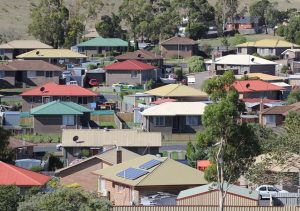Migrants not to blame for housing crisis – conference told [FECCA]
Migrants are not to blame for Australia’s housing crisis, but treating housing as an investment vehicle is, according to Greens MP Max Chandler Mather.
Speaking at the recent Federation of Ethnic Communities Councils of Australia (FECCA) conference in Brisbane, Mr Chandler Mather said huge profiteering by the banks and generous tax breaks for property investors had generated the crisis.
“During the height of the pandemic, net migration fell below zero, but house prices still soared. Scapegoating migrants only takes pressure off of the rich and powerful,” he said.
Mr Chandler-Mather reiterated his calls for nationally co-ordinated rent freeze caps and the phasing out of negative gearing and capital gains tax discounts on house sales.
“Migration is not the primary cause of the housing crisis,” he said.
 He pointed instead to the “tens of billions of dollars” the government doled out to property investors, a lack of rent caps and chronic underinvestment in public housing.
He pointed instead to the “tens of billions of dollars” the government doled out to property investors, a lack of rent caps and chronic underinvestment in public housing.
“I suppose I get frustrated with this because to be perfectly frank, even if Australia’s migration was brought down to net-zero as it was during Covid, that did not solve the housing crisis,” Mr Chandler-Mather said.
In the year to September, Australia’s net overseas migration reached an estimated 518,000.
Building approvals, a leading indicator of Australia’s residential construction pipeline, meanwhile fell to just under 163,000 in the year to March 2024.
Mr Chandler-Mather said Australia needed migration and did not want to see migrants being “demonised” and blamed for the crisis.
“In the past Australia’s had high rates of migration, and it hasn’t been a problem because governments have invested in building government homes,” he said.
Mr Chandler-Mather said Australia’s housing system, which allowed people to treat homes as a “lucrative financial asset” had also led to a large number of vacant homes across the country, despite record low vacancy rates.
“Australia is facing a housing affordability crisis. Millions of people are locked out of the housing market, renters are struggling with high rents, and the waitlist for social housing has blown out to 50,000 people,” he said.
“Meanwhile, many parents are worried about how their children will afford a home and young families are struggling to find affordable suburbs to settle down in. Many more just can’t find a place they can afford in a suburb they want to live in.
“People wait for over a decade to access public housing in some parts of Australia, while hundreds of thousands of people seek help from homelessness services every year.
“Women, especially older women, have been the fastest growing group of people experiencing homelessness. The Covid-19 pandemic has further deepened this crisis, with many thousands of women and children being forced to choose between returning to violent partners or becoming homeless,” he said.
Mr Chandler Mather outlined the Greens housing policy at the conference.
He said the Greens will establish a Federal Housing Trust to build a million public and social homes across cities, towns, regions and remote areas over 20 years.
He committed to 875,000 new public and community houses to slash public housing waiting lists and end homelessness as well as a 125,000 new shared ownership homes, which will allow first-home buyers locked out of the housing market to buy a home where they want to live for $300,000.
“The scale of the build would obliterate social housing waiting lists and reduce homelessness, especially in groups like women and children facing domestic violence, First Nations people, and migrants and refugees, who face higher rates of homelessness>” Mr Chandler Mather said.
“Building one million homes will reduce insecure housing and poverty, place downward pressure on rents and house prices, and stimulate the economy,” he said.
The Greens also want more protections for renters, including: caps on rent increases; and end to ‘no grounds’ evictions; the right to longer leases, and; the right for tenants to make minor changes to the home.
Public housing is also a focus of Greens policy with plans to build 875,000 public homes across Australia with rents caped at 25 per cent of the tenant’s income or market rent, whichever is lower.












